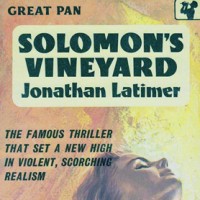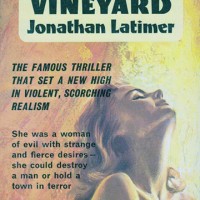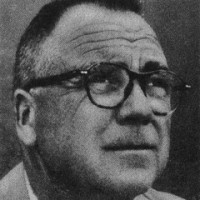Knight: Area student became novelist, writer for film, TV
Jonathan Latimer wasn't from Peoria, but the 1929 graduate of Knox College in Galesburg became "one of the best Golden Age authors of the hard-boiled school you've probably never heard of," said one critic, and Turner Classic Movies (TCM) on Friday, June 21 is showing two classic film noir movies he wrote.
Latimer's writing career went from covering Al Capone to working with Frank Capra, adapting novels by Dashiell Hammett and Kenneth Fearing to writing more than 40 scripts for TV's "Perry Mason."
After earning his bachelor's degree, Phi Beta Kappa, from Knox, Latimer traveled to Europe and biked through Germany and France, then returned to Chicago, where he worked for the Herald-Examiner and the Tribune newspapers, mostly covering crime at a time when there was a lot of it.
"I knew Al Capone, George 'Bugs' Moran and assorted other gangsters, as well as whorehouse madams, pimps, dope peddlers and con men," Latimer said years later.
He left journalism after writing a news story about FDR's Interior Secretary Harold Ickes, who liked Latimer and hired him to ghost-write a book. In 1935 Latimer turned to writing novels, starting with a series of mysteries featuring hard-drinking private eye William Crane, an operative for the Black Detective Agency, in which Latimer introduced his distinctive blend of hard-boiled crime fiction and screwball comedy.
"Murder in the Madhouse" was Latimer's first novel, one of five in the Crane series. It became so popular that three were made into movies starring Preston Foster as Crane. The other books were "Headed for a Hearse," "The Lady in the Morgue," "The Dead Don't Care" and "Red Gardenias."
Through the 1940s and '50s his books also included mainstream novels "The Search for My Great Uncle's Head" (under the pseudonym Peter Coffin) and "Dark Memory," and crime novels with protagonists other than Crane: "Black Is the Fashion for Dying," "Sinners and Shrouds" and "Solomon's Vineyard," a rather steamy book that was suppressed in the United States for a few years. (Here's a hint why: Its opening line is "From the way her buttocks looked under the black silk dress, I knew she'd be good in bed.")
After serving in the Navy during World War II, Latimer shifted to writing for Hollywood, where he aimed for realism, or at least believability, as he explained in an interview about his 1948 adaptation of Cornell Woolrich's best-selling "Night Has A Thousand Eyes."
"What I hoped to establish," Latimer said, in a conversation near the end of his life, "was a real sense of terror that these things were coming true."
Besides "Night Has A Thousand Eyes," Latimer's screenplays are impressive: "The Big Clock" (based on Kenneth Fearing's novel), "The Glass Key" (from Dashiell Hammett's book), "The Lone Wolf Spy Hunt" (based on Louis Joseph Vance's novel), "Plunder of the Sun" (based on David F. Dodge's novel), "Topper Returns" (an original script), "The Unchained Goddess" (with Frank Capra), "The Unholy Wife" (co-authored with William Durkee), "The Strange Case of the Cosmic Rays" (also with Capra) and the two motion pictures featured on TCM next week, "Nocturne" (from 1946), and "They Won't Believe Me" (1947, based on a story by Gordon McDonell).
For a while Latimer lived in Key West, where he became friends with Ernest Hemingway, and after starting to work for Hollywood he moved to LaJolla, Calif., where his neighbors included legendary hard-boiled author Raymond Chandler, who also had turned some of his attention to working for the movies (penning the film version of his own "Big Sleep" and the original screenplay "The Blue Dahlia").
Latimer eventually settled into a routine of writing for television, contributing dozens of episodes (some say 45) for "Perry Mason" and other scripts (such as "The Greenhouse Jungle" for Peter Falk's "Columbo" series, but "Nocturne" and "They Won't Believe Me" may be his best work.
"Nocturne" (scheduled to air at 7 p.m. June 21) was produced by longtime Alfred Hitchcock associate Joan Harrison and directed by Edwin L. Marin. It stars George Raft and Lynn Bari in a story about a determined cop (Raft) who won't accept that the death of a Hollywood film composer was suicide. He begins looking for "Dolores," a name in a song by the victim, then discovers the dead man had a list of models as girlfriends – and that 10 of them had motives for killing him.
"They Won't Believe Me" (scheduled to air at 8:45 p.m. June 21) is an often-unheralded classic of film noir, toying with cinematic clichés and plot coincidences – and starring Robert Young (eventually starring in TV's "Father Knows Best"), cast against type as a playboy on trial for a murder he didn't commit. Also produced by Joan Harrison, the movie was directed by Irving Pichel and co-stars Susan Hayward and Jane Greer. Somewhat foreshadowing Latimer's fascination with trials that he demonstrated in "Perry Mason," much of it is set in a courtroom, where Young testifies about his innocence – and his adultery, and foolishness, and stupidity.
A long way from Central Illinois. (At least, it's hoped.)



